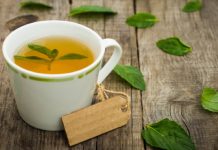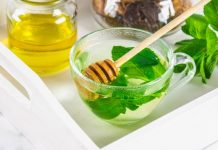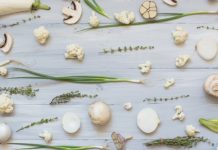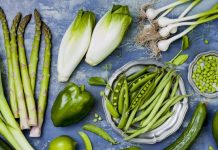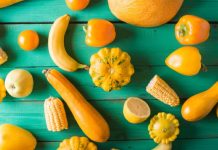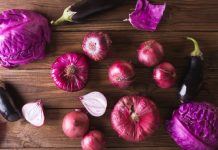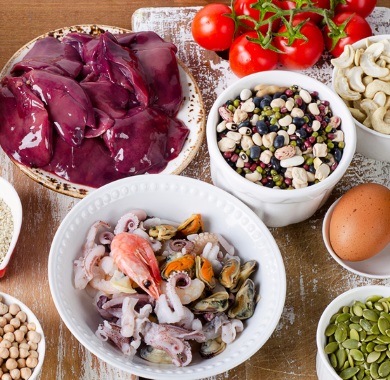
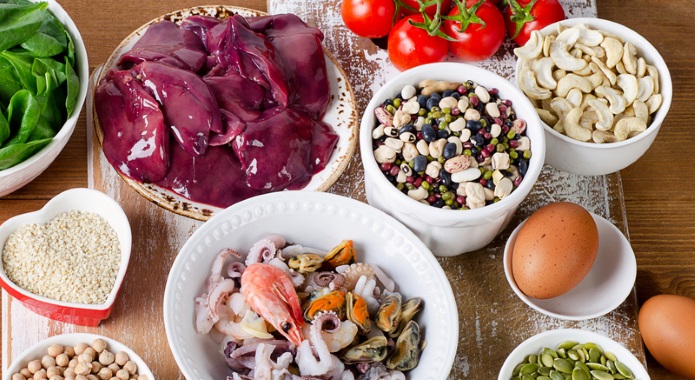
Are you looking for the most comprehensive list of high iron foods? Then scroll below as I have created the biggest resource out there that will provide you with top foods from each category and their iron content.
Whether you are a meat lover, vegetarian or even vegan, thanks to this post you will discover the best sources for either heme or non-heme iron in different categories of food.
TOP 15 HIGH-IRON FOODS EVER
| # | FOOD | IRON PER 3.5oz/100g |
|---|---|---|
| 1. | Raw Goose Liver | 30.5 mg |
| 2. | Dark Chocolate | 17.4 mg |
| 3. | Dry-Roasted Pumpkin Seeds | 14.9 mg |
| 4. | Whole & Dried Sesame Seeds | 14.1 mg |
| 5. | Raw Clams | 14.0 mg |
| 6. | Raw Turkey Liver | 12.0 mg |
| 7. | Raw Red Kidney Beans | 9.4 mg |
| 8. | Sun-Dried Tomatoes | 9.1 mg |
| 9. | Raw Chicken Liver | 9.0 mg |
| 10. | Raw Small White Beans | 7.7 mg |
| 11. | Uncooked Amaranth | 7.6 mg |
| 12. | Uncooked Teff | 7.6 mg |
| 13. | Raw Lima Beans | 7.5 mg |
| 14. | Raw Lentils | 7.5 mg |
| 15. | Dried Watermelon Seeds | 7.3 mg |
This data is collected from an excellent website called Nutritiondata.Self.com
HIGH IRON ORGAN MEATS
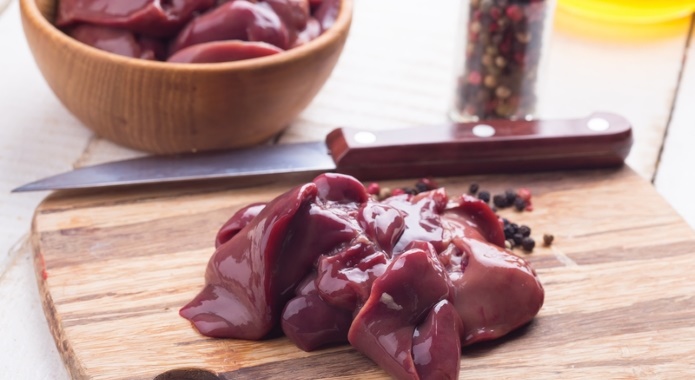
| # | FOOD | IRON PER 3.5oz/100g |
|---|---|---|
| 1. | Raw Goose Liver | 30.5 mg |
| 2. | Raw Turkey Liver | 12.0 mg |
| 3. | Raw Chicken Liver | 9.0 mg |
| 4. | Raw Lamb Kidneys | 6.4 mg |
| 5. | Raw Chicken Heart | 6.0 mg |
| 6. | Raw Beef Liver | 4.9 mg |
| 7. | Raw Pork Kidneys | 4.6 mg |
| 8. | Raw Lamb Heart | 4.6 mg |
| 9. | Raw Beef Kidneys | 4.6 mg |
| 10. | Raw Turkey Gizzards | 4.3 mg |
| 11. | Raw Beef Heart | 4.3 mg |
| 12. | Raw Veal Heart | 4.2 mg |
| 13. | Raw Turkey Heart | 4.2 mg |
| 14. | Raw Veal Kidneys | 3.4 mg |
| 15. | Raw Chicken Gizzards | 2.5 mg |
| 16. | Raw Beef Brain | 2.5 mg |
| 17. | Raw Veal Brain | 2.1 mg |
| 18. | Raw Lamb Brain | 1.8 mg |
| 19. | Raw Pork Brain | 1.6 mg |
This data is collected from an excellent website called Nutritiondata.Self.com
Organ meats are the richest sources of heme iron you can find. There are many organ meats, but the ones containing the most iron are goose liver, turkey liver, and chicken liver.
You can easily incorporate these into a delicious meal. Also, the liver is full of other minerals and fats. The best part? Organ meats are very filling so you will not be able to overeat on these.
HIGH IRON NUTS & SEEDS
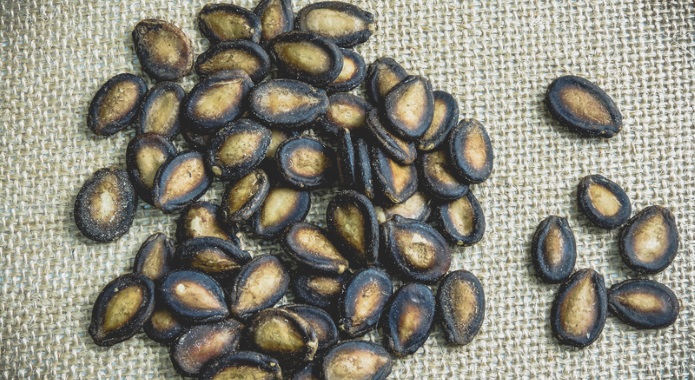
| # | FOOD | IRON PER 3.5oz/100g |
|---|---|---|
| 1. | Dry-Roasted Pumpkin Seeds | 14.9 mg |
| 2. | Whole & Dried Sesame Seeds | 14.5 mg |
| 3. | Cocoa Seeds | 13.9 mg |
| 4. | Dried Watermelon Seeds | 7.3 mg |
| 5. | Raw Cashew Nuts | 6.7 mg |
| 6. | Flaxseeds | 5.7 mg |
| 7. | Pine Nuts (Dried) | 5.5 mg |
| 8. | Cottonseed Kernels (Roasted) | 5.4 mg |
| 9. | Sunflower Seeds (Dried) | 5.2 mg |
| 10. | Safflower Seeds (Dried) | 4.9 mg |
| 11. | Hazelnuts | 4.7 mg |
| 12. | Peanuts (Raw) | 4.6 mg |
| 13. | Almonds (Dry-Roasted) | 4.5 mg |
| 14. | Pistachios (Dry-Roasted) | 4.2 mg |
| 15. | Macadamia Nuts (Raw) | 3.7 mg |
| 16. | Walnuts | 3.1 mg |
| 17. | Pecans | 2.5 mg |
| 18. | Coconut Meat (Raw) | 2.4 mg |
| 19. | Sweet Chestnuts (Roasted) | 0.9 mg |
This data is collected from an excellent website called Nutritiondata.Self.com
Nuts and seeds, in general, are quite a good source of non-heme iron. Seeds richest in iron are pumpkin seeds, sesame seeds, and cocoa seeds. From nuts, there are richest sources such as cashew nuts, pine nuts, and hazelnuts.
Except iron, nuts and seeds provide your body with a lot of other minerals and healthy fats. You should either snack on these throughout your day or add them into your main meals.
READ MORE: Top 19+ Nuts & Seeds High in Iron
SHELLFISH & SEAFOOD HIGH IN IRON
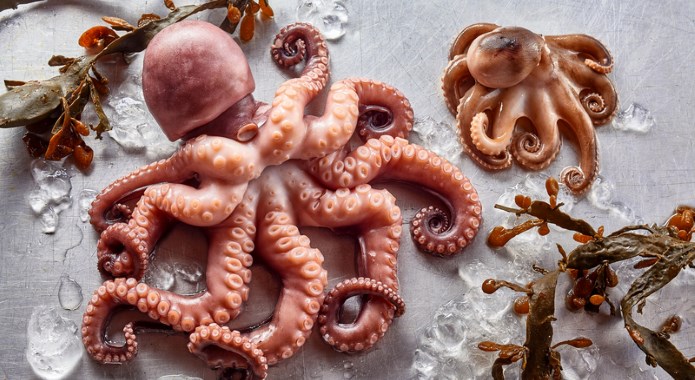
| # | FOOD | IRON PER 3.5oz/100g |
|---|---|---|
| 1. | Clams (Raw) | 14.0 mg |
| 2. | Eastern Oysters (Raw) | 6.7 mg |
| 3. | Cuttlefish | 6.0 mg |
| 4. | Octopus (Raw) | 5.3 mg |
| 5. | Pacific Oyster (Raw) | 5.1 mg |
| 6. | Whelk (Raw) | 5.0 mg |
| 7. | Blue Mussels (Raw) | 3.9 mg |
| 8. | Abalone | 3.2 mg |
| 9. | Queen Crab (Raw) | 2.5 mg |
| 10. | Shrimps (Raw) | 2.4 mg |
| 11. | Conch (Baked) | 1.4 mg |
| 12. | Spiny Lobster (Raw) | 1.2 mg |
| 13. | Wild Crayfish (Raw) | 0.8 mg |
| 14. | Blue Crab (Raw) | 0.7 mg |
| 15. | Alaska King Crab (Raw) | 0.6 mg |
| 16. | Dungeness Crab (Raw) | 0.4 mg |
| 17. | Northern Lobster (Raw) | 0.3 mg |
| 18. | Scallop | 0.3 mg |
This data is collected from an excellent website called Nutritiondata.Self.com
Seafood and shellfish are good sources of animal-based iron. The richest foods from this category are clams, eastern oysters, cuttlefish, and octopus.
Although seafood is becoming more intoxicated with heavy metals and other nasty stuff, it can still be prepared into a delicious meal that will satisfy your needs for iron.
LEGUMES HIGH IN IRON
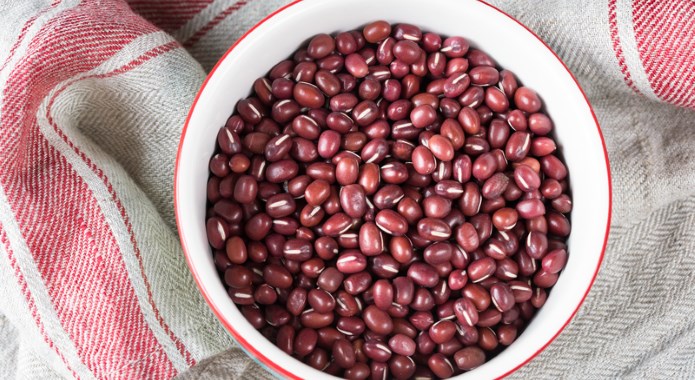
| # | FOOD | IRON PER 3.5oz/100g |
|---|---|---|
| 1. | Raw Red Kidney Beans | 9.4 mg |
| 2. | Raw Small White Beans | 7.7 mg |
| 3. | Raw Lima Beans | 7.5 mg |
| 4. | Raw Lentils | 7.5 mg |
| 5. | Raw Pink Beans | 6.8 mg |
| 6. | Raw Chickpeas | 6.2 mg |
| 7. | Raw Navy Beans | 5.5 mg |
| 8. | Raw Great Northern Beans | 5.5 mg |
| 9. | Raw Tofu | 5.4 mg |
| 10. | Raw Pinto Beans | 5.1 mg |
| 11. | Raw Black Beans | 5.0 mg |
| 12. | Raw Adzuki Beans | 5.0 mg |
| 13. | Raw Soybeans | 3.6 mg |
| 14. | Raw French Beans | 3.4 mg |
| 15. | Raw Podded Peas | 2.1 mg |
| 16. | Fava Beans in Pod | 1.5 mg |
| 17. | Raw Green Peas | 1.5 mg |
| 18. | Raw Green Beans | 1.0 mg |
This data is collected from an excellent website called Nutritiondata.Self.com
Legumes, in general, are quite a good source of plant-based iron. If you want to increase your iron intake, then you should focus mostly on red kidney beans, small white beans, lima beans, and lentils.
Legumes also include a lot of dietary fiber. This special form of carbohydrate is necessary for proper bowel movements, healthy digestion, and balanced blood sugar.
GRAINS & CEREALS HIGH IN IRON

| # | FOOD | IRON PER 3.5oz/100g |
|---|---|---|
| 1. | Uncooked Amaranth | 7.6 mg |
| 2. | Uncooked Teff | 7.6 mg |
| 3. | Oats | 4.7 mg |
| 4. | Wheat | 4.6 mg |
| 5. | Uncooked Quinoa (False Cereal) | 4.6 mg |
| 6. | Sorghum | 4.4 mg |
| 7. | Kamut (Uncooked) | 4.4 mg |
| 8. | Spelt (Uncooked) | 4.4 mg |
| 9. | Cornmeal (Whole-Grain) | 3.5 mg |
| 10. | Millet (Raw) | 3.0 mg |
| 11. | Rye | 2.7 mg |
| 12. | Dry Bulgur | 2.5 mg |
| 13. | Barley (Raw) | 2.5 mg |
| 14. | Buckwheat | 2.2 mg |
| 15. | Brown Rice (Raw) | 1.8 mg |
| 16. | Couscous (Dry) | 1.1 mg |
This data is collected from an excellent website called Nutritiondata.Self.com
Grains are not the greatest source of plant-based iron. Although there are some good sources such as amaranth or teff, there are even richer foods from other categories. If you decide to add iron from grains, then try to pair it with some vitamin C that increases the ability of your body to absorb this mineral.
Although grains are not the richest source of iron in your diet, they contain a lot of other minerals and dietary fiber that is necessary if you want a healthy digestion and balanced blood sugar.
READ MORE: Top 16+ Grains High in Iron
FRUITS HIGH IN IRON
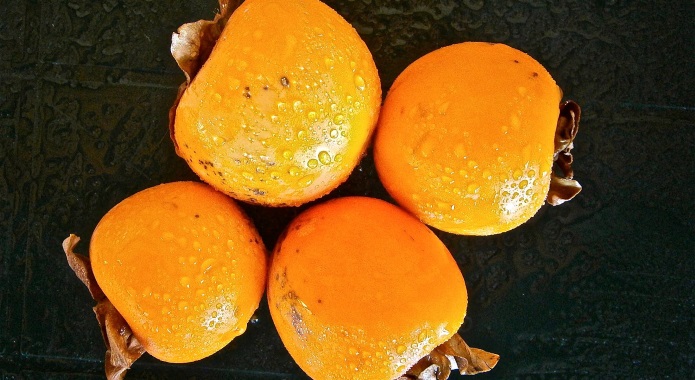
| # | FOOD | IRON PER 3.5oz/100g |
|---|---|---|
| 1. | Sun-Dried Tomatoes | 9.1 mg |
| 2. | Ripe Canned Olives | 3.3 mg |
| 3. | Dried Apricots | 2.7 mg |
| 4. | Seeded Raisins | 2.6 mg |
| 5. | Persimmon (Raw) | 2.5 mg |
| 6. | Mulberries (Raw) | 1.9 mg |
| 7. | Elderberries (Raw) | 1.6 mg |
| 8. | Black Currants (Raw) | 1.5 mg |
| 9. | Red/White Currants (Raw) | 1.0 mg |
| 10. | Medjool Dates | 0.9 mg |
| 11. | Prunes | 0.9 mg |
| 12. | Lemons (Raw) | 0.7 mg |
| 13. | Raspberries (Raw) | 0.7 mg |
| 14. | Blackberries (Raw) | 0.6 mg |
| 15. | Figs (Raw) | 0.4 mg |
| 16. | Strawberries (Raw) | 0.4 mg |
| 17. | Bananas (Raw) | 0.3 mg |
| 18. | Blueberries (Raw) | 0.3 mg |
| 19. | Cranberries (Raw) | 0.3 mg |
| 20. | Kiwi (Raw) | 0.3 mg |
| 21. | Nectarines (Raw) | 0.3 mg |
| 22. | Pineapple (Raw) | 0.3 mg |
| 23. | Pomegranates (Raw) | 0.3 mg |
| 24. | Watermelon (Raw) | 0.2 mg |
| 25. | Cantaloupe (Raw) | 0.2 mg |
| 26. | Apple (Raw) | 0.1 mg |
| 27. | Mango (Raw) | 0.1 mg |
| 28. | Oranges (Raw) | 0.1 mg |
| 29. | Papaya (Raw) | 0.1 mg |
| 30. | Red/Pink Grapefruit (Raw) | 0.1 mg |
This data is collected from an excellent website called Nutritiondata.Self.com
Fruits, in general, are not a very good source of plant-based iron. However, as I was doing research on this topic, I have discovered three groups of fruits that are worth mentioning:
- Technical fruits
- Dried fruits
- Fresh fruits
The richest sources of iron provide so-called “technical” fruits, ones that people consider to be vegetables but are technically a fruit. These include tomatoes (sun-dried), and olives.
Then there is a category of dried fruits that are on the second place and include foods such as dried apricots, seeded raisins, and prunes. Last but not least, there is the category of fresh fruit that has some good sources such as raw persimmons, mulberries, elderberries, and black currants.
READ MORE: Top 30+ Fruits High in Iron
EGGS HIGH IN IRON
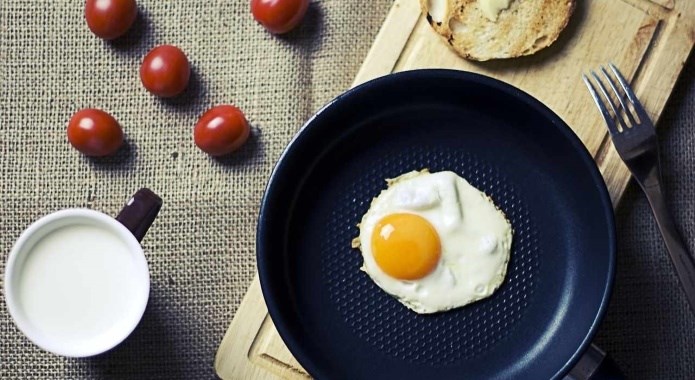
| # | FOOD | IRON PER 3.5oz/100g |
|---|---|---|
| 1. | Raw Turkey Egg | 4.1 mg |
| 2. | Raw Duck Egg | 3.8 mg |
| 3. | Raw Goose Egg | 3.6 mg |
| 4. | Raw Quail Egg | 3.6 mg |
| 5. | Raw Chicken Egg | 1.8 mg |
This data is collected from an excellent website called Nutritiondata.Self.com
Although there are not that many eggs I was able to find nutritional info on, I have still decided to create this subcategory. From what I was able to learn, eggs are a good source of animal-based iron.
Especially turkey eggs, duck eggs, and goose eggs. Just keep in mind that once you boil eggs (or use extensive heat during the preparation of your meal), they will lose some of that iron.
HIGH IRON FISH
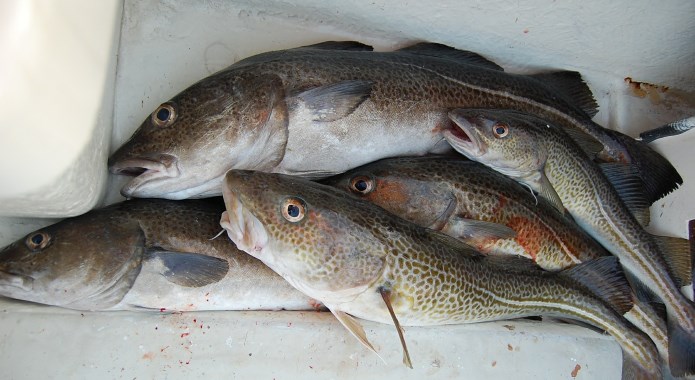
| # | FOOD | IRON PER 3.5oz/100g |
|---|---|---|
| 1. | Raw European Anchovy | 3.3 mg |
| 2. | Atlantic Sardines Canned in Oil | 2.9 mg |
| 3. | Raw Atlantic Mackerel | 1.6 mg |
| 4. | Raw Haddock | 1.1 mg |
| 5. | Fresh Raw Tuna | 1.0 mg |
| 6. | Raw Ocean Perch | 0.9 mg |
| 7. | Raw Bass | 0.8 mg |
| 8. | Raw Atlantic Halibut | 0.8 mg |
| 9. | Raw Rainbow Trout | 0.7 mg |
| 10. | Raw Wild Salmon | 0.6 mg |
| 11. | Raw Atlantic Cod | 0.4 mg |
| 12. | Raw Flounder (Flatfish) | 0.4 mg |
This data is collected from an excellent website called Nutritiondata.Self.com
As you can see in the table above, fish meat is not a very good source of heme iron when compared to other categories of meat in this list. If you want to replenish your iron levels through fish meat, then focus on meat from anchovy, sardines, and mackerel.
These are all tasty and can be easily prepared at home. If you combine this meat with some legumes and seeds, you will make a meal that is really filling and rich on iron.
READ MORE: Top 12+ Fish High in Iron
TUBERS HIGH IN IRON

| # | FOOD | IRON PER 3.5oz/100g |
|---|---|---|
| 1. | Raw Sunchoke (Jerusalem Artichoke) | 3.4 mg |
| 2. | Potatoes with Skin | 3.2 mg |
| 3. | Raw Cassavia (Brazilian Arrowroot) | 2.2 mg |
| 4. | Raw Lotus Root | 1.2 mg |
| 5. | Raw Yautia | 1.0 mg |
| 6. | Jicama | 0.6 mg |
| 7. | Raw Sweet Potatoes | 0.6 mg |
| 8. | Raw Taro | 0.5 mg |
| 9. | Raw Yam | 0.5 mg |
This data is collected from an excellent website called Nutritiondata.Self.com
If you are a vegetarian or even a vegan, tubers are a good source of iron for your body. Actually, you should focus mostly on sunchoke, potatoes, and cassavia.
All these are an excellent side dish that could increase your daily intake of plant-based iron. Just do not forget to pair these with vitamin C to increase its absorption by your body.
HIGH-IRON LEAFY GREEN VEGETABLES
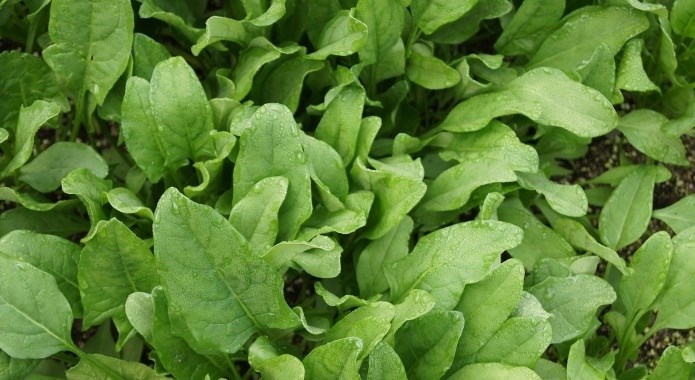
| # | FOOD | IRON PER 3.5oz/100g |
|---|---|---|
| 1. | Raw Dandelion Greens | 3.1 mg |
| 2. | Raw Kale Leaves | 3.0 mg |
| 3. | Raw Spinach Leaves | 2.7 mg |
| 4. | Beet Greens | 2.6 mg |
| 5. | Raw Amaranth Leaves | 2.3 mg |
| 6. | Rapini (Broccoli Rabe) | 2.1 mg |
| 7. | Raw Purslane | 2.0 mg |
| 8. | Raw Swiss Chard Leaves | 1.8 mg |
| 9. | Arugula | 1.5 mg |
| 10. | Raw Mustard Greens | 1.5 mg |
| 11. | Butterhead Lettuce | 1.2 mg |
| 12. | Raw Turnip Greens | 1.1 mg |
| 13. | Raw Romaine Lettuce | 1.0 mg |
| 14. | Raw Bok Choy | 0.8 mg |
| 15. | Raw Endive | 0.8 mg |
| 16. | Raw Broccoli | 0.7 mg |
| 17. | Raw Cabbage | 0.5 mg |
| 18. | Raw Collard Greens | 0.2 mg |
| 19. | Watercress | 0.2 mg |
This data is collected from an excellent website called Nutritiondata.Self.com
Leafy green vegetables are another good source of plant-based iron for vegetarians and vegans. The best food from this category includes dandelion greens, kale leaves, spinach leaves, and beet greens.
You can either eat these fresh and raw, or you can add them to your salad or make a juice/smoothie out of these.
HIGH IRON MEATS
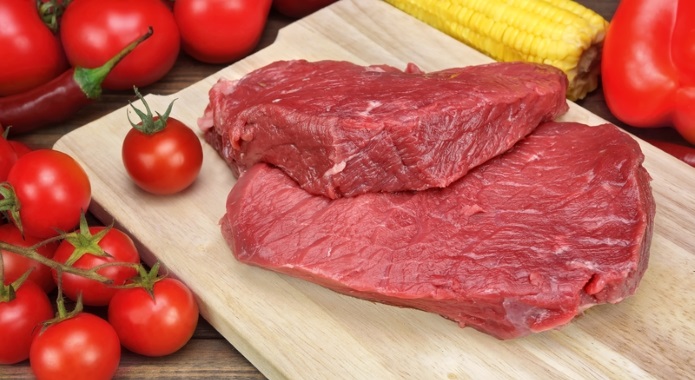
| # | FOOD | IRON PER 3.5oz/100g |
|---|---|---|
| 1. | Raw Venison | 2.9 mg |
| 2. | Raw Lean Lamb Chop | 1.9 mg |
| 3. | Raw Lean Grass-Fed Beef | 1.5 mg |
| 4. | Raw Turkey Breast with Skin | 1.2 mg |
| 5. | Raw Ground Veal | 0.8 mg |
| 6. | Chicken Breast with Skin (Raw) | 0.7 mg |
| 7. | Extra Lean Ham | 0.7 mg |
This data is collected from an excellent website called Nutritiondata.Self.com
As you can see, meat, in general, is not a very good source of heme iron. However, if you want to increase your daily dose of heme iron through lean meat, then my recommendation is to choose venison, lamb chops, lean grass-fed beef, and turkey breast with skin.
Although there are much better sources of iron in this list, you can combine grilled turkey breasts with some legumes or grains for a proper dose of iron.
HIGH IRON STALK VEGETABLES

| # | FOOD | IRON PER 3.5oz/100g |
|---|---|---|
| 1. | Raw Asparagus | 2.1 mg |
| 2. | Leeks | 2.1 mg |
| 3. | Raw Palm Hearts | 1.7 mg |
| 4. | Raw Fiddlehead Ferns | 1.3 mg |
| 5. | Raw Cardoon | 0.7 mg |
| 6. | Fennel | 0.7 mg |
| 7. | Raw Bamboo Shoots | 0.5 mg |
| 8. | Rhubarb | 0.3 mg |
| 9. | Celery | 0.2 mg |
This data is collected from an excellent website called Nutritiondata.Self.com
Stalk vegetables are a little bit better source of iron than squashes. However, this category is not very rich. However, the most potent sources of iron include asparagus, leeks, and palm hearts.
You can add these easily to your daily diet. For example, add lightly steamed asparagus to your salad and you will increase your intake of iron.
HIGH IRON MUSHROOMS
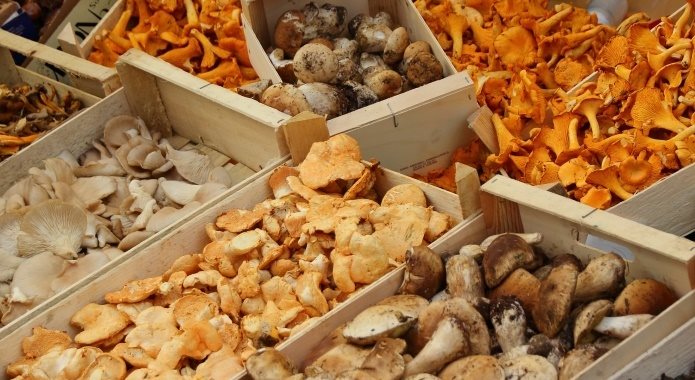
| # | FOOD | IRON PER 3.5oz/100g |
|---|---|---|
| 1. | Raw Oyster Mushroom | 1.3 mg |
| 2. | Raw Enoki Mushroom | 1.1 mg |
| 3. | Raw Portabella Mushroom | 0.6 mg |
| 4. | Raw White Button Mushrooms | 0.5 mg |
| 5. | Raw Brown Mushroom | 0.4 mg |
| 6. | Raw Maitake Mushroom | 0.3 mg |
This data is collected from an excellent website called Nutritiondata.Self.com
Mushrooms are a very poor source of iron. However, if you are a vegetarian or a vegan, you can add these to your meals to provide at least some extra source of iron.
From what I was able to learn, you should focus on oyster mushrooms and enoki mushrooms. However, if you are not looking exclusively for mushrooms, try other sources from this list.
HIGH-IRON ROOT VEGETABLES
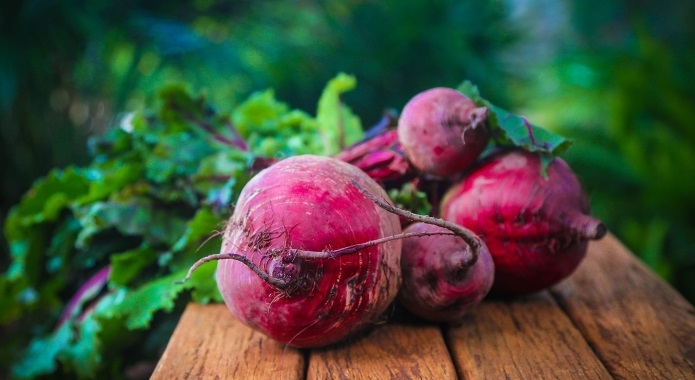
| # | FOOD | IRON PER 3.5oz/100g |
|---|---|---|
| 1. | Raw Parsley | 6.2 mg |
| 2. | Raw Beets | 0.8 mg |
| 3. | Raw Daikon Radish | 0.8 mg |
| 4. | Raw Salsify | 0.7 mg |
| 5. | Raw Ginger Root | 0.6 mg |
| 6. | Raw Parsnips | 0.6 mg |
| 7. | Raw Rutabagas | 0.5 mg |
| 8. | Horseradish | 0.4 mg |
| 9. | Raw Kohlrabi | 0.4 mg |
| 10. | Raw Carrots | 0.3 mg |
| 11. | Raw Radishes | 0.3 mg |
| 12. | Raw Turnips | 0.3 mg |
| 13. | Raw Celery / Celeriac | 0.2 mg |
This data is collected from an excellent website called Nutritiondata.Self.com
Except for a parsley, root veggies do not include a lot of iron. The richest root vegetables include also beets, daikon radishes, salsify, and ginger root.
Root vegetables may provide a lot of other minerals and a huge amount of energy in the form of starch. These are an excellent choice for both hot and cold salads.
HIGH IRON SQUASHES
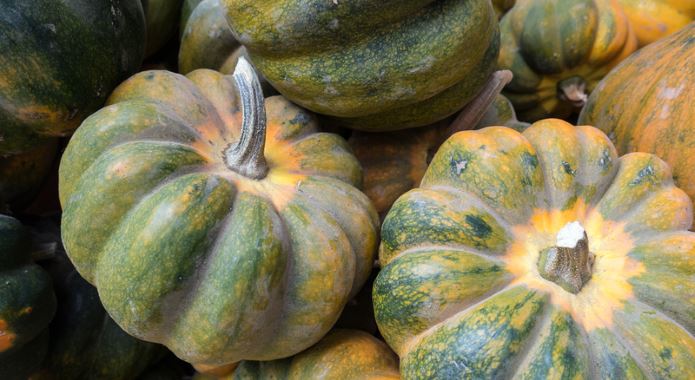
| # | FOOD | IRON PER 3.5oz/100g |
|---|---|---|
| 1. | Raw Zucchini Squash | 0.8 mg |
| 2. | Raw Acorn Squash | 0.7 mg |
| 3. | Raw Butternut Squash | 0.7 mg |
| 4. | Raw Scallop Squash | 0.4 mg |
| 5. | Raw Hubbard Squash | 0.4 mg |
| 6. | Raw Spaghetti Squash | 0.3 mg |
| 7. | Raw Indian Squash | 0.2 mg |
This data is collected from an excellent website called Nutritiondata.Self.com
Squashes are a group of vegetables that are not very rich in iron. That is why you should go for better sources. However, if you still want to eat squashes for an additional dose of iron, then go for zucchini squash, acorn squash, or butternut squash.
Meals made out of these squashes are ideal for a cold autumn evening. When you combine these with other food that is richer in iron, you can create a meal that will significantly boost your daily intake.
HERBS HIGH IN IRON
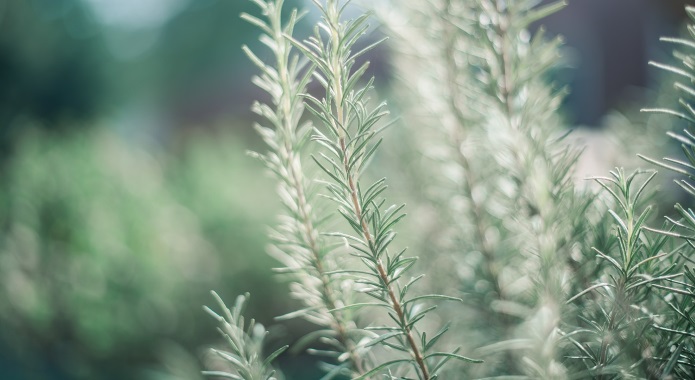
| # | FOOD | IRON PER 1oz/28g |
|---|---|---|
| 1. | Dried Thyme | 34.6 mg |
| 2. | Dried Parsley | 27.4 mg |
| 3. | Dried Spearmint | 24.5 mg |
| 4. | Dried Marjoram | 23.2 mg |
| 5. | Cumin Seeds | 18.6 mg |
| 6. | Dried Dill Weed | 13.7 mg |
| 7. | Celery Seeds | 12.6 mg |
| 8. | Dried Oregano | 12.3 mg |
| 9. | Dried Coriander Leaf | 11.9 mg |
| 10. | Dried Basil | 11.8 mg |
| 11. | Ground Turmeric | 11.6 mg |
| 12. | Anise Seeds | 10.3 mg |
| 13. | Fenugreek Seeds | 9.4 mg |
| 14. | Dried Tarragon | 9.0 mg |
| 15. | Dried Chervil | 8.9 mg |
| 16. | Curry Powder | 8.3 mg |
| 17. | Dried Rosemary | 8.2 mg |
| 18. | Black Pepper | 8.1 mg |
| 19. | Ground Sage | 7.9 mg |
This data is collected from an excellent website called Nutritiondata.Self.com
Dried herbs you use to add flavor to your meals are incredibly rich in iron. Especially thyme, parsley, spearmint, marjoram, and cumin.
One thing that is bad is the fact that you are not able to eat such amounts of dried herbs. However, if you avoided culinary herbs until know, then you have one good reason to add these to your meals.


